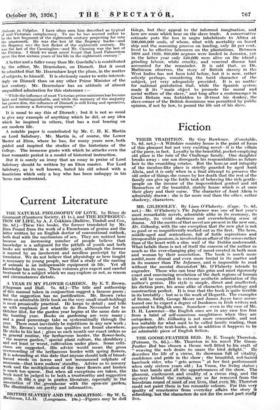MR. GILHOOLEY. By Liam O'Flaherty. (Cape. 7s. 6d. net.)—Mr. O'Flaherty's
The Informer was one of last year's most remarkable_ novels, admirable alike in its economy, its intensity, its vivid starkness and overwhelming sense of drama. All the merits of that novel are present in the new one, Mr. Gilhooley, with the one_exception that the new plot is not so good or so magnifiCently worked out as the first. The hero, middle-aged and sententious, full of futile aspirations and irresponsible passions, is involved in an affair of the senses rather than of the heart with a slim waif of the Dublin underworld. What befalls them is not of itself the concern of the author so much as the ever-changing play of mood created in both man and woman by their association. The book is much more sordid, more dismal and even more brutal in its matter and in its manner than The Informer, and is impossible to read Without the mental discomfort' Mr. O'Flaherty intends to engender. Those who can bear this grim and most rigorously exact and convincing revelation of the dark regions of human life will be compelled to extreme aesthetic admiration of the author's genius. His style is simple, direct and unaffected, his diction pure, his sense alike of character, psychology and construction perfect. It is true that the book is quite terrible in its brutality : but so is the work of Hogarth. The examples of Sterne, Swift, George Moore and James Joyce have accui!- tomed one to expect a degree of frankness in Irish writers not accorded to English ones. Somehow—even in the case of Mr: D. H. Lawrence—the English ones are in any ease less free from a taint of self-conscious naughtiness when they are outspoken. Mr. Gilhooley is not more censorable, and not less suitable for what used to be called family reading, than Psycho-analytic text-books, and in addition it happens to be an admirable piece of English fiction.


























































 Previous page
Previous page